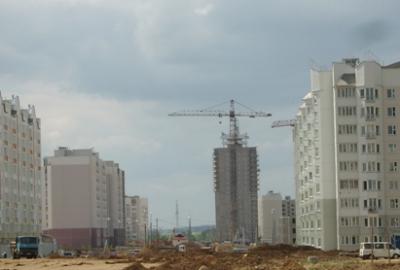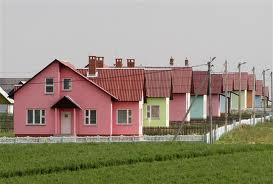The Rise and Fall of Affordable Housing in Belarus

Whether you arrive in Minsk from the airport, bus or railway station, one of the first things you notice is abundant construction. You will see construction sites almost everywhere.
New shiny office buildings of glass and concrete grow in the centre. On the outskirts you’ll mainly see multistory block residential houses. Subsidised loans is one explanation of this boom.
A sad truth here is that Minsk seems to be the only place in Belarus where life is really bubbling. Growth of other Belarusian cities is slow and continues thanks to strong urbanisation processes and migration. In rural parts of the country population is decreasing dramatically ‒ up to 4% during 2011, and the state encourages people to move to rural areas by offering free housing in newly constructed buildings.
Rush for Flats
Population growth rate in Belarus has been negative already for many years. But demand for improvement of housing conditions never stops. In Minsk it is, for sure, the greatest. Flats, however, cost no less than in many Western European capitals. And Belarusians with their less than $500 average monthly salary are usually unable to satisfy housing needs independently. That is probably why within the last five years over 60 per cent of new flats were built with state support.
Before 2011 subsidised loans were the main form of state support. Those who managed to prove their compliance with special criteria such as being a large or young family, living in a dorm for over than 10 years could get such loans.
State support recipients were getting loans for construction of new flats at annual rate of 5% (sometimes even 1%) for the period of up to 40 years. In the meantime, even before the economic crisis of 2011, Belarusian rouble’s inflation varied around 10-12%.
 Mock marriages, large families for the pure sake of getting loans became an unspoken part of Belarusian reality. Compared to 2006 the official list of people in need of housing conditions’ improvement in 2012 increased by more than 50%. By 2012, however, this state generosity started to crumble.
Mock marriages, large families for the pure sake of getting loans became an unspoken part of Belarusian reality. Compared to 2006 the official list of people in need of housing conditions’ improvement in 2012 increased by more than 50%. By 2012, however, this state generosity started to crumble.
Justice à-la Belarus
Destructive effects of Belarusian social programmes on its financial situation have always been manifest to those who understand economics basics. Thanks to the 2011 economic crisis the sad consequences became clear even to Belarusian authorities. In June 2011 banks suspended approval of new subsidised loans.
Subsidised loans reappeared only in April 2012 after the president cut the list of state support’s addressees more than twice. About 400 families had to say goodbye to their dreams of better housing conditions. Those who managed to benefit from subsidised loans suffer as well.
Lukashenka ordered to unmask the lessors of flats acquired thanks to state aid and to take such flats away from them. The society has quickly divided into two parts in relation to the issue. Some people consider the president’s threat to be just: the state should bring the cheaters to responsibility. Others argue that such deprivation would be illegal.
In a country with developed rule of law and respect for private property the latter position would probably prevail. Belarusian law does not provide for taking any flat away if it is rented. Consequently, any deprivation on these grounds is impossible. But Belarus is the country where the president rules. If he decides to implement his “just” idea, that will not take a long time.
We Are Where We Live
As a result of the need to build many flats in Minsk quickly the absolute majority of new houses are block houses. Affordability of block houses’ flats is one of the most important reasons of their popularity. Such buildings usually have no special decoration and are very similar in their design. What is even worse, many are build close to historical buildings in the centre of Minsk depriving it of its old European charm.
Many blocks of flats look similar. Getting to a newly built outskirts region reminds Minsk residents of a popular Soviet comedy where one drunk person confused his own flat in Moscow with another flat in Leningrad – the only difference between houses was their addresses. The only novelty about today's block houses is the multitude of their colours.

At the same time foreign investors have recently started to finance construction of improved comfort buildings. The advantages of their outer and inner design are obvious and citizens consider them as a desired escape from their accommodations’ uniform.
However, because Belarusians still have a rather low purchasing power, realtors forecast that sale of the improved apartments may take up to 7 years.
Village Paradise
Incubator architecture is common not only for Minsk residential houses. Belarusian agrotowns is another bright example. For sure, it was Lukashenka who introduced the village paradise with urban benefits. Since 2005 about 1500 such towns have grown in the whole country. The cost of each of agrotown amounts up to $1 mln.
Some agrotowns appeared from scratch, others developed in the already existing settlements. But irrespectively of their history and geographical location, all agrotowns look the same. As with blocks of flats the main difference is addresses and colours.
These new buildings are supposed to attract young professionals to Belarusian villages. If they decide to move to the rural area, they can get one of such houses for free. However, lower salaries and lack of career opportunities in rural areas make young university graduates less enthusiastic about agrotowns.
Young Belarusians prefer to struggle for a small flat in a huge block of flats in Minsk rather than get a separate house in rural area for free.





